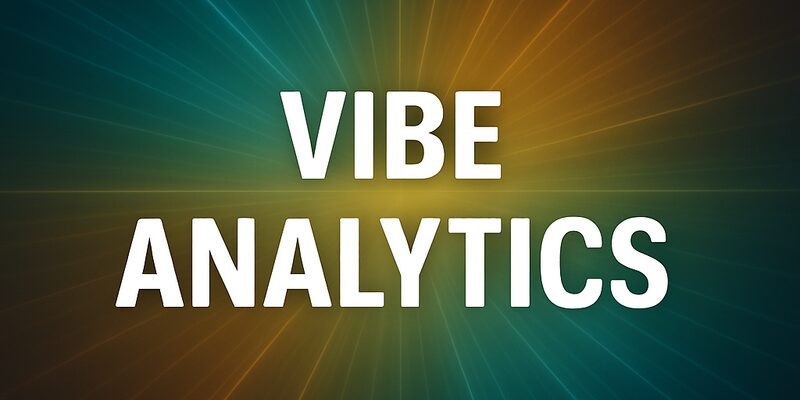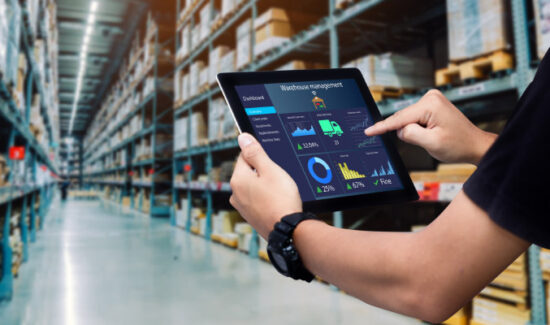The 13 Best Vibe Analytics Tools to Consider for 2025


Solutions Review’s listing of the best vibe analytics tools is an annual mashup of products that best represent current market conditions, according to the crowd. Our editors selected the best vibe analytics tools based on each solution’s Authority Score; a meta-analysis of real user sentiment through the web’s most trusted business software review sites, and our own proprietary five-point inclusion criteria.
The editors at Solutions Review have developed this resource to assist buyers in search of the best vibe analytics tools to fit the needs of their organization. Choosing the right vendor and solution can be a complicated process — one that requires in-depth research and often comes down to more than just the solution and its technical capabilities.
To make your search a little easier, we’ve profiled the best vibe analytics tools providers all in one place. We’ve also included platform and product line names and introductory software tutorials straight from the source so you can see each solution in action.
Note: The best vibe analytics tools are listed in alphabetical order.
The Best Vibe Analytics Tools
Alteryx
Platform: Alteryx Analytics Process Automation
Related products: Alteryx Designer, Alteryx Intelligence Suite, Alteryx Server, Alteryx Connect, Alteryx Promote
Description: Alteryx offers data science and machine learning functionality via a suite of software products. Headlined by Alteryx Designer which automates data preparation, data blending, reporting, predictive analytics, and data science, the self-service platform touts more than 260 drag-and-drop building blocks. Alteryx lets users see variable relationships and distributions quickly, as well as select and compare algorithm performance with ease. No coding is required while the software can be deployed in the cloud, behind your own firewall, or in a hosted environment.
Databricks
Platform: Databricks Unified Analytics Platform
Description: Databricks offers a cloud and Apache Spark-based unified analytics platform that combines data engineering and data science functionality. The product leverages an array of open-source languages and includes proprietary features for operationalization, performance, and real-time enablement on Amazon Web Services. A Data Science Workspace enables users to explore data and build models collaboratively. It also provides one-click access to preconfigured ML environments for augmented machine learning with popular frameworks.
Formula Bot
Platform: Formula Bot
Description: Formula Bot is an AI-powered data analytics assistant designed to help users quickly extract insights from spreadsheets, CSV files, and connected sources like Google Sheets and Google Analytics using natural language prompts. By allowing users to “ask anything” in plain English, Formula Bot automatically generates charts, summaries, tables, and even text analysis—including sentiment detection and keyword extraction—without the need for technical skills or manual formula writing.
Platform: Google Cloud AI Platform
Related products: Google Cloud Data Fusion, Google Cloud AutoML, Google BigQuery ML, Google AI Platform Notebooks, Google TensorFlow
Description: Google Cloud AI offers one of the largest machine learning stacks in the space and offers an expanding list of products for a variety of use cases. The product is fully managed and offers excellent governance with interpretable models. Key features include a built-in Data Labeling Service, AutoML, model validation via AI Explanations, a What-If Tool which helps you understand model outputs, cloud model deployment with Prediction, and MLOps via the Pipeline tool.
InfraNodus
Platform: InfraNodus
Description: InfraNodus is a text‑network visualization and analysis tool developed by Nodus Labs that helps users turn textual content into insight by mapping the relationships between words and ideas. It converts any text (PDFs, CSVs, notes, search results, website content, etc.) into a network graph where words are nodes and co‑occurrences are edges; it then applies graph‑theory metrics (like betweenness centrality, community detection) to reveal key topics, influential concepts, and “structural gaps” — places where different clusters are weakly connected, suggesting opportunities for new ideas or research.
Julius AI
Platform: Julius AI
Description: Julius AI is an AI‑powered data analyst platform that lets users upload data (spreadsheets, CSVs, PDFs, Google Sheets, and more), ask questions in natural English, and get visualizations, statistical insights, models, and reports without writing code. It supports data cleaning, merging, filtering, forecasting, and predictive modeling, with built‑in charts and tables, as well as workflows or “notebooks” to structure repeated analysis. It also offers collaboration features (shared workspace, team roles), handles large files, and emphasizes security and compliance (e.g. SOC 2, GDPR in progress).
Knowi
Platform: Knowi
Description: Knowi is an augmented business‑intelligence platform that merges natural language processing, AI‑powered insights, and flexible data connectivity to let users query and explore data in plain English. It supports both structured and semi‑structured data (SQL, NoSQL, APIs, documents, etc.), enabling schema‑on‑read, real‑time queries, visual dashboards, multi‑source joins, and embedded analytics.
Microsoft
Platform: Azure Machine Learning
Related products: Azure Data Factory, Azure Data Catalog, Azure HDInsight, Azure Databricks, Azure DevOps, Power BI
Description: The Azure Machine Learning service lets developers and data scientists build, train, and deploy machine learning models. The product features productivity for all skill levels via a code-first and drag-and-drop designer, and automated machine learning. It also features expansive MLops capabilities that integrate with existing DevOps processes. The service touts responsible machine learning so users can understand models with interpretability and fairness, as well as protect data with differential privacy and confidential computing. Azure Machine Learning supports open-source frameworks and languages like MLflow, Kubeflow, ONNX, PyTorch, TensorFlow, Python, and R.
Plotly
Platform: Plotly Dash
Description: Plotly Dash is a Python framework for building interactive, production-ready web applications with minimal code. It combines powerful data visualization from Plotly with a reactive layout system, enabling developers to write pure Python (or R/Julia) for UI, interactivity, and callbacks—no need for JavaScript. Dash apps support dynamic updates, modular components, and full customization, making it ideal for data scientists and analysts who want to turn code into shareable dashboards.
Qlik
Platform: Qlik Sense
Related products: QlikView, Qlik Analytics Platform
Description: Qlik offers a broad spectrum of BI and analytics tools, which is headlined by the company’s flagship offering, Qlik Sense. The solution enables organizations to combine all their data sources into a single view. The Qlik Analytics Platform allows users to develop, extend and embed visual analytics in existing applications and portals. Embedded functionality is done within a common governance and security framework. Users can build and embed Qlik as simple mashups or integrate within applications, information services or IoT platforms.
Salesforce
Platform: Einstein Analytics Platform
Related products: Salesforce Einstein Discovery, Salesforce Einstein Data Insights
Description: The Salesforce Einstein Analytics platform is available in a number of flavors based on role, industry and included features. The product’s automated data discovery capabilities enable users to answer questions based on transparent and understandable AI models. Users can also tailor analytics to their use case and enhance insights with precise recommendations and specific guidance. Einstein lets you create advanced experiences using customizable templates, third-party apps, or custom-build dashboards as well.
Tellius
Platform: Tellius
Description: Tellius offers an AI-driven decision intelligence platform that enables fast insights from data. The company helps customers hasten their time-to-insight through augmentation and automation. The Tellius Platform combines AI and machine learning with a search interface for ad hoc exploration so users can ask questions about their business data, analyze billions of records, and gain automated insights. The company recently launched Live Insights, which offers AI-guided insights from cloud data warehouses without moving data.
ThoughtSpot
Platform: ThoughtSpot
Description: ThoughtSpot is heavily influenced by artificial intelligence and automation. While it may seem complex, ease of use is a strength of the product. It features a full-stack architecture and intuitive insight generation capabilities via the in-memory calculation engine. A distributed cluster manager provides customizable scaling options, and support for existing ETL solutions ensures proper connectivity to desired data sources. ThoughtSpot Embrace allows you to run search and AI analytics directly in existing databases, and supports Google Cloud Storage.




































